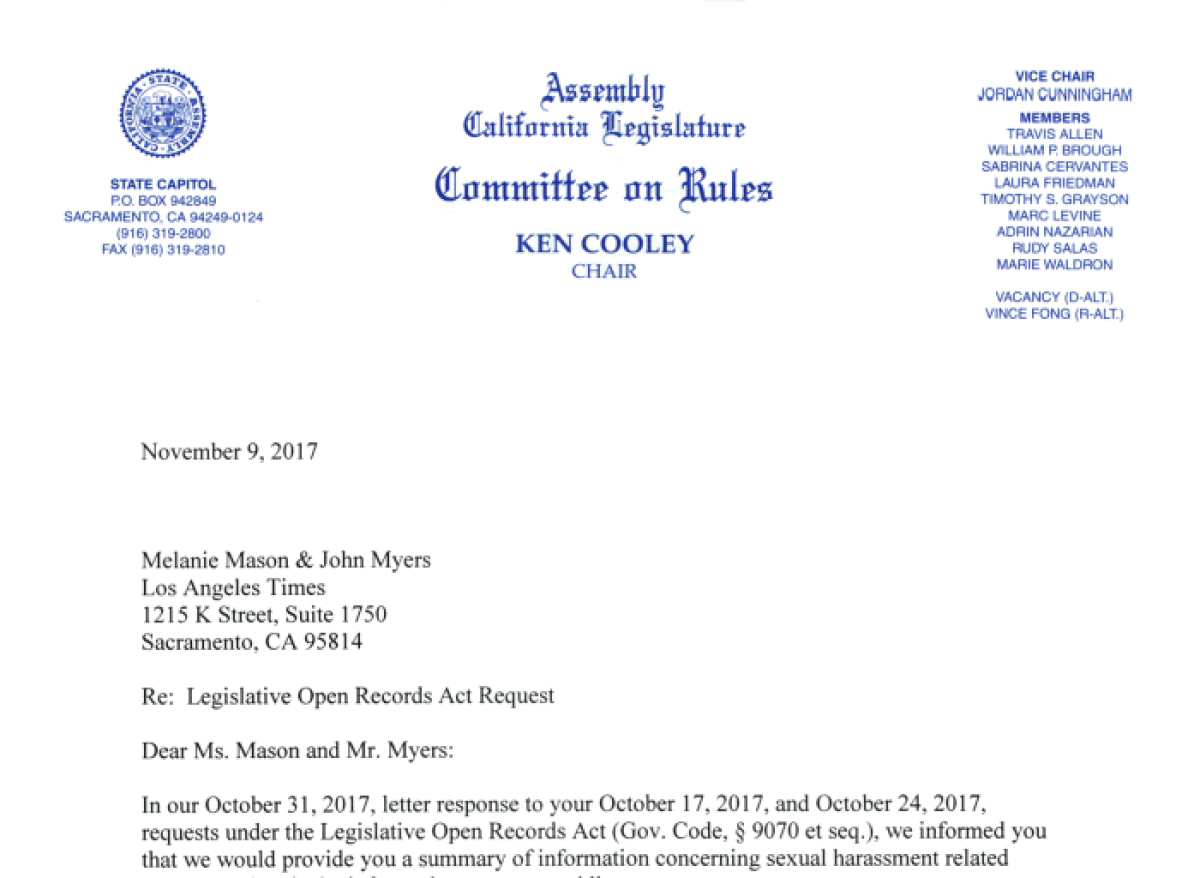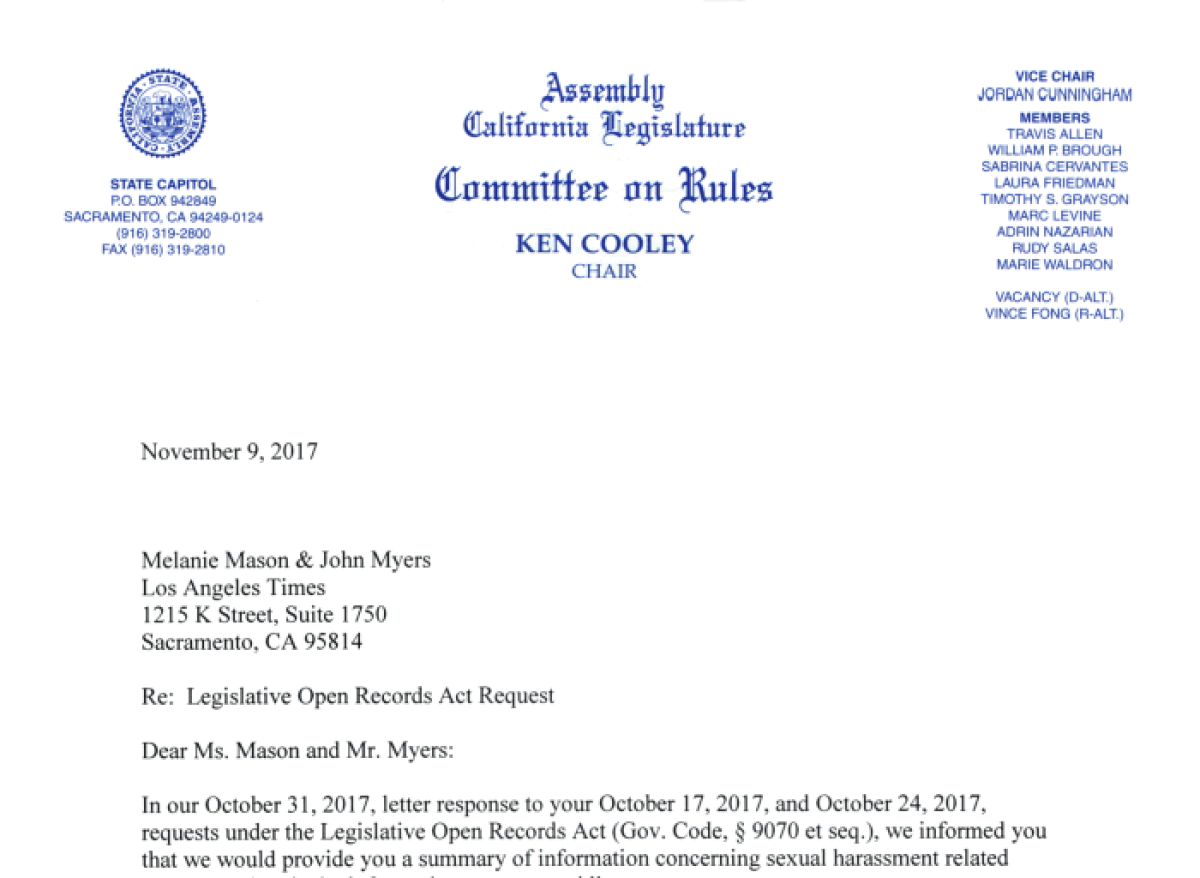California’s Legislature investigated 31 abuse complaints made over the past decade

- Share via
The California Legislature has investigated 31 allegations of sexual harassment since 2006, according to brief summaries released without more detailed information on Thursday.
The release of the total number of investigations comes after the Los Angeles Times requested specific information following allegations in a letter signed by scores of women that a “pervasive” culture of harassment exists in and around the state Capitol. Some of those women called Thursday’s limited release of information disappointing.
In separate documents, the Senate disclosed 15 investigations and the Assembly disclosed 16. The documents do not detail specifics, offer dates of the incidents, outline the complaints or divulge any information about whether the investigations were related to lawmakers or staff. None of the documents offer any explanation about the result of the investigations.
The nature of the summaries paints a murky picture of how many complaints were filed, and offers no information on the cost of the 31 investigations paid by the taxpayer-funded institutions.
Because the summary document fails to delineate between complaints and investigations, some key elements of how top legislative officials have handled abuse allegations remain unclear. Neither house has offered an explanation on how officials decide which complaints are quickly dismissed and which are elevated to the status of a formal investigation — especially those which trigger the hiring of an outside law firm. Officials also have not offered any explanation on which charges lead to discipline of a staffer and which ones lead to someone being fired.
The lack of disclosure makes it impossible for the public to assess whether the 31 investigations over 11 years accurately reflect the size and seriousness of abuse allegations — or whether the summaries instead downplay the scope of the issue.
The Times recently reported about one investigation included in the tally of investigations: a 2009 claim by legislative staffer Elise Flynn Gyore that she was groped by Raul Bocanegra, then a chief of staff and now an Assembly Democrat from Pacoima. Bocanegera was disciplined at the conclusion of a formal investigation by the Assembly Rules Committee. He apologized when The Times asked him about the incident and said it was “something I regret and learned from.”
Both houses provided The Times with copies of a total of 15 personnel settlements which resulted in payouts of more than $1 million, but did not specify how many of those agreements were in response to accusations of abuse or sexual harassment.
The Assembly said Thursday that the documents released cover a variety of workplace issues. Eleven settlements were reached with Senate employees since 2006 and four with those who worked for the Assembly. There are mentions of “harassment” in only three of documents related to settlements totaling at least $250,000. But the settlements include scant information about allegations or investigations. Some, but not all, cases have been previously publicized.
Three complaints were investigated in the Senate in both 2009 and 2015, the most active years. The Assembly reported its busiest year of investigation to be 2009, when there were four. Only one investigation has been conducted in 2017 in both houses, according to the reports.
While limited in detail, the information nonetheless provides the first official glimpse of the statehouse work environment when it comes to complaints of inappropriate behavior. The House and Senate rejected The Times’ request for specifics and instead provided the summaries, arguing that such disclosure “compromises the privacy rights of victims, witnesses, and others.”
The Times did not seek identifying information about victims or the accused in the initial requests. A subsequent request sought cases involving current and former legislative employees and current or former lawmakers in which the charges were found true or discipline was imposed.
The Times had requested aggregate data on abuse complaints beginning in 2006, as well as settlement amounts paid out and the cost borne by taxpayers for hiring outside investigators to review allegations. Legislative officials were asked, too, to disclose the number of staffers who had been reassigned in the wake of abuse complaints.
Officials previously said the California Legislative Open Records Act allows them to block the release of more detailed information. The 1975 law gives the Legislature more discretion in shielding records than does the broader California Public Records Act that applies to all other state and local agencies.
“Public disclosure may even have the unfortunate effect of discouraging our employees and others from coming forward with complaints or information,” Daniel Alvarez, the secretary of the state Senate, wrote in an Oct. 31 letter to The Times.
Debra Gravert, the Assembly’s top staffer, gave the same explanation in a letter delivered on the same day.
Political Road Map: California's Legislature has disclosure rules that don't apply to anyone else »
Sexual harassment in the workplace is prohibited by both state and federal law. The Assembly’s personnel manual goes even further, describing a stringent “zero tolerance” standard — including behavior which “may not be sufficiently severe or pervasive to constitute sexual harassment in violation of law.”
The documents released Thursday were created “for the purpose of promoting public discourse and attention to the important issue of sexual harassment in the workplace,” according to letters from both houses to The Times.
The Senate released 72 pages of settlement documents, with the dollar amount totaling $599,584. In some cases, the parties said they would keep the agreement confidential, with one employee agreeing to simply tell people the “matter has been resolved.” The Assembly released 30 pages of settlement documents, with agreements totaling $415,000. These other settlements ranged from back pay to cash settlements for reasons often described vaguely as “disputes and/or issues.”
David Snyder, executive director of the nonprofit First Amendment Coalition, urged lawmakers to go beyond the minimum amount of disclosure on the existence of abuse complaints under the Capitol dome.
“Given the current political climate, I think the Legislature should disclose all of it,” Snyder said of The Times’ request. “The more the Legislature hides behind the special statute it created for itself, the more it looks like they have something to hide.”
Senate President Pro Tem Kevin de León (D-Los Angeles) and Assembly Speaker Anthony Rendon (D-Paramount) did not immediately respond to requests for comment about why staff didn’t release more-comprehensive information.
The Times has asked for additional details on the 2009 Bocanegra investigation, but Assembly officials haven’t yet responded to the request. The same is true for subsequent efforts to obtain records focused on Bocanegra in the Assembly and comprehensive data from both houses regarding the final disposition of cases in which evidence of abuse or harassment was believed to exist.
A statement from We Said Enough, the women’s group created after the public letter on harassment, said the Legislature “continues to do what it does best, protect itself” by not releasing more information.
Times staff writer Melanie Mason contributed to this report.
ALSO:
Follow @johnmyers on Twitter, sign up for our daily Essential Politics newsletter and listen to the weekly California Politics Podcast










